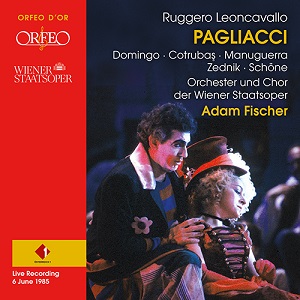
Ruggero Leoncavallo (1857-1919)
Pagliacci – Dramma in due atte (1893)
Canio: Plácido Domingo (tenor), Nedda: Ileana Cotrubas (soprano), Tonio: Matteo Manuguerra (baritone), Peppe: Heinz Zednik (tenor), Silvio: Wolfgang Schöne (baritone), Due Contadine: Josef Pogatschnig & Wolfgang Witte
Choir & Orchestra of the Vienna State Opera/Adam Fischer
rec. live 6 June 1985, Wiener Staatsoper, Vienna, Austria
No libretto
Orfeo C240121 [74]
This is a re-release of an Austrian Radio recording which first appeared on CD in 2008, when it was well received by Gramophone with what might be construed as the back-handed compliments of “stylish” and “well-mannered”. I have long enjoyed Domingo’s 1971 recording on RCA but he was in considerably fresher, more youthful voice then and top notes – always an Achilles’ heel with him – came more easily. Fourteen years later, he is hardly in his dotage and one would think that he could not be better partnered than by two more favourite singers here in Ileana Cotrubas and Matteo Manuguerra. A totally visceral Canio such as that delivered by Del Monaco or Corelli was never Domingo’s USP, so I was interested to hear what he did with the role in Vienna. I have never particularly thought of Adam Fischer as a conductor of verismo but he began his career in Germany conducting opera, so that was an additional point of interest. In fact, I find his conducting to be the best feature by far of this performance; he seems quite at home in the idiom and I would cite his control of the lovely Intermezzo as evidence of his aptitude – I just wish he had a better orchestra as there are quite a few blips (e.g. the trumpet in the introduction to Act II) and tuning and coordination issues.
The sound is OK, even if everything sounds a bit remote compared with a studio recording. There is a lot of stage thumping and, as ever, it is marred by frequent, inconsiderate and unnecessary coughing right from the start. I swear some people go the opera and concerts specially to cough. I have always been a fan of Matteo Manuguerra but his baritone is rather more laboured with a more pronounced vibrato than usual and his delivery of the famous Prologue less nuanced than I would like; nor is his optional top A flat secure or well-held – and he appears to have a frog in the throat. The audience expresses more appreciation than I can summon up. Domingo’s “Grazie, grazie” on his entrance is inaudible and he sounds to be in one of his nasal periods, without the thrilling heft required. He often doesn’t have the pharyngeal resonance to convey the barely concealed violence of Canio’s nature – though he makes quite a convincing job of the top B on the final “a ventitré ore!”. “Vesti la giubba” is delivered with passion but not the ring of his youth; once again, however, the audience is vociferously appreciative, despite some nasty out of tune playing from the strings in the coda; evidently it was effective as drama. Of the three principal singers, that leaves Ileana Cotrubas, who can always be relied upon to excel in generating pathos and she delves into her lower-register agreeably, but she doesn’t have the delicacy and agility of Caballé or, indeed, the under-rated Gabriella Tucci. Still, the audience loves her and she creates a credible Nedda. Wolfgang Schöne is utterly charmless and unlovely of tone as Silvio, shouting his love for her in stentorian fashion and allowing his vibrato to oscillate wildly. Turn to singers such as Zanasi, Capecchi and Allen for real elegance and youthful ardour. The comprimario singers are poor and the chorus adequate.
The commedia can hardly fail to deliver a coup de théâtre even in a mediocre performance. Heinz Zednik’s Peppe/Beppe is acceptable but there are much more seductive accounts of Arlecchino’s arioso wooing Colombina. Manuguerra fails to find the humorous and varied vocal inflections that artists such as Gobbi and Milnes apply to Taddeo’s antics. Canio’s ranting finds Domingo’s tenor turning increasingly squeezed when he needs power. I really cannot share the audience’s rapture – but of course attending a live performance is a different experience from listening to a recording forty years later.
All in all, I fail to see the attraction of this issue and refer you to my survey for recommendations providing a much more visceral and engaging experience – including Domingo’s younger self, better partnered and recorded.
Ralph Moore
Buying this recording via a link below generates revenue for MWI, which helps the site remain free




















